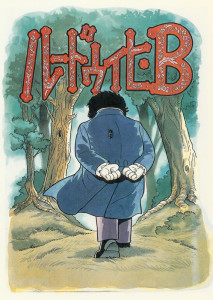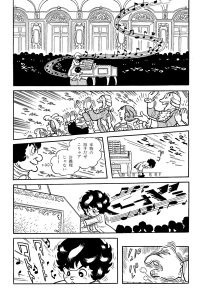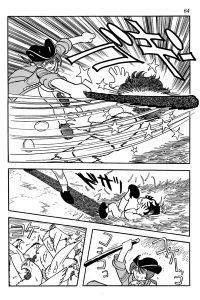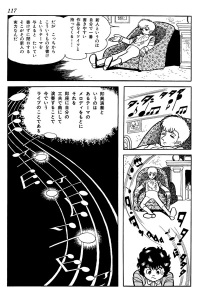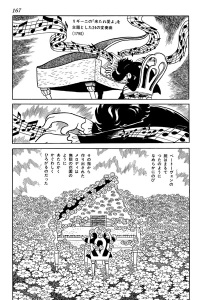Ludwig B (Manga)
Also known as ルードヴィヒ・B (Rudovihi B)
| English Title: | Ludwig B |
| In English? | Yes |
| Japanese Title: | ルードヴィヒ・B Rudovihi B |
| Type: | Ongoing Serial |
| Original run: | 1987/06 – 1989/02 |
| Published in: | Comic Tom 潮出版社 |
| Published by: | Ushio Shuppan Co. |
| Volumes: | 2 MT-337 | MT-338 |
Tezuka’s unfinished symphony, Ludwig B (1987-89) was published in Comic Tom from June 1987 to February 1989 – ending abruptly, mid-story, with Osamu Tezuka’s untimely death on February 9, 1989. A fictionalized biography, it is similar in (planned) scope to his earlier biographical manga series, Buddha (1972-83).
What it’s about
The story begins in Vienna, circa 1762 with the birth of Franz, son of the Duke of Kreuzstein. When a pet peacock named Ludwig abruptly screeches in the Duke’s pregnant wife’s ear, the shock sends her into premature labour. Although the baby Franz is successfully revived, his mother, Antonia, does not survive the ordeal, leaving the Duke blaming his new born son for the loss of his beloved wife… and thus installing a deep-rooted hatred in young Franz for anyone (or anything) named “Ludwig”.
As fate would have it, a few years later, in 1770, a baby is born to a court musician named Johann von Beethoven and his wife Maria in Bonn, Germany, and the couple choose that very name of their young son… Ludwig.
Growing up in Bonn, young Ludwig von Beethoven is pushed by his father to mercilessly practice the piano – convinced that developing his son’s musical talents to their utmost is necessary if he is to escape the shackles of shame and abuse that come with a musician’s need for a wealthy benefactor among the aristocracy. The early acclaim his six-year-old son receives only increases his drive, especially after Johann’s alcoholism threatens his own livelihood.
After Franz is sent to Bonn to live with distant relatives, fate intervenes and, during a chance encounter in the streets, learns of the young medical prodigy’s name. Just hearing the name “Ludwig” throws Franz into an uncontrollable rage, and he strikes the young boy mercilessly in the ear with his cane – leaving Beethoven with a life-long hearing disability.
Undaunted however, young Ludwig pursues his musical studies with a passion. Seeking out and studying under W. A. Mozart for a short time in Vienna before events conspire to return him home to Bonn. Despite the setbacks that come from an alcoholic father, his infatuation with a pretty aristocratic lady, an eager young student with a healthy distrust of commoners, not to mention the French Revolutionary wars, young Ludwig catches the eye of the renowned composer Joseph Haydn.
Under the tutelage of the musical master, Ludwig von Beethoven is posed to begin his own rise towards musical greatness…
What you should know
For most fans, Osamu Tezuka’s near idolization of Walt Disney (both personally and his work) and its impact on Tezuka’s own life and career is well known. His near insatiable appetite for films – sometimes viewing multiple films in a single sitting – is also well documented. However, what is perhaps less well known, is that Osamu Tezuka was also a great admirer of classical music – and of the works of Ludwig von Beethoven in particular. The halls of the Mushi Productions studios would often reverberate with the sounds of the 5th symphony being played at full blast.
So it shouldn’t really come as any surprise that when it came time to discuss a follow up manga to Tezuka’s massive biography of the life Siddhartha Gautama in Buddha (1972-83), Beethoven was chosen from a list of several other candidates… including his idol, Walt Disney.
The reason for this has a lot to with the fact that in March 1987 Osamu Tezuka was asked by the Japanese Ministry of Foreign Affairs to attend an international conference being held in the town of Nancy, France. Making the most of his time in Europe, he also traveled to Vienna, Austria and visited many of Beethoven’s old haunts – including his old music room, even getting the chance to sit at the great composer’s own piano.
This experience was so inspiring to Tezuka that, upon his return to Japan, he went directly from the airport to the Ushio Shuppannsha Co. offices, publishers of Comic Tom, to discuss the project with the editorial staff. Originally planned as a long-form manga, similar in scope to Budddha (1972-83), Tezuka’s new series, Ludwig B (1987-89) also borrowed heavily, in style if not content, from the popular recent (at that time) motion picture, Amadeus (1984) – including a title incorporating only the composer’s less iconic first name.
Unfortunately, with Osamu Tezuka’s untimely passing in February 1989, the planned epic was never fully realized. Instead, Ludwig B (1987-89) only covers Beethoven’s youth. One can only dream of what the finished epic would have been like. It surely would have been considered another of Tezuka’s masterpieces. However, it was not to be, and Ludwig B (1987-89), along with Gringo (1987-89) and Neo Faust (1988), are considered Tezuka’s three unfinished works instead.
However, even in its abbreviated state, Ludwig B (1987-89) is some of Tezuka’s finest work. The story is presented in realistic and un-idealized manner, similar to that of Milos Foreman’s film biography, Amadeus (1984). His panel layout and overall artistry are at their peak. They match the subject matter very well, almost to the point where you can hear the music itself wafting off the pages.
Throughout the work, the affinity Tezuka felt for Beethoven is evident. In fact, Tezuka felt there were many similarities between their lives – often pointing out the fact that they had both moved several times, and had no fixed addresses, prior to settling down and getting married, as proof of this. He also felt that he understood the challenges the musical genius must have faced – at one point in the story young Ludwig even screams out (in a drunk rage) that “manga and music are the same battle!”
As such, it is not really surprising that Tezuka used Ludwig B (1987-89) to make some of his own views known. During Ludwig’s first real meeting with W. A. Mozart, the older genius says:
Amateurs always have the tendency to compose something which is well within their comfort zone, but as soon as they must do it on a given theme, it’s another story. This is how we judge talent – by liberally and spontaneously composing on a theme, from a melody that was just heard… It’s the mastery of the theme, the development of the melody, the frequency and the skill with which this appears in the work which testifies to its worth” (1987).
This sentiment mirrors precisely Tezuka’s own thoughts on what young manga authors are often lacking. This is punctuated by the fact that he was able to seamlessly deliver the message, through the dialogue of a well-known historical figure in a biographical manga tale, without missing a beat – a hallmark of Tezuka’s own mastery of the medium.
Where you can get it
Luckily for English-speaking fans, in November/December 2014, DMP successfully ran a Kickstarter campaign to have Ludwig B (1987-89) published in English for the first time. It was released in early 2015 as a lovely 2-volume softcover edition.

